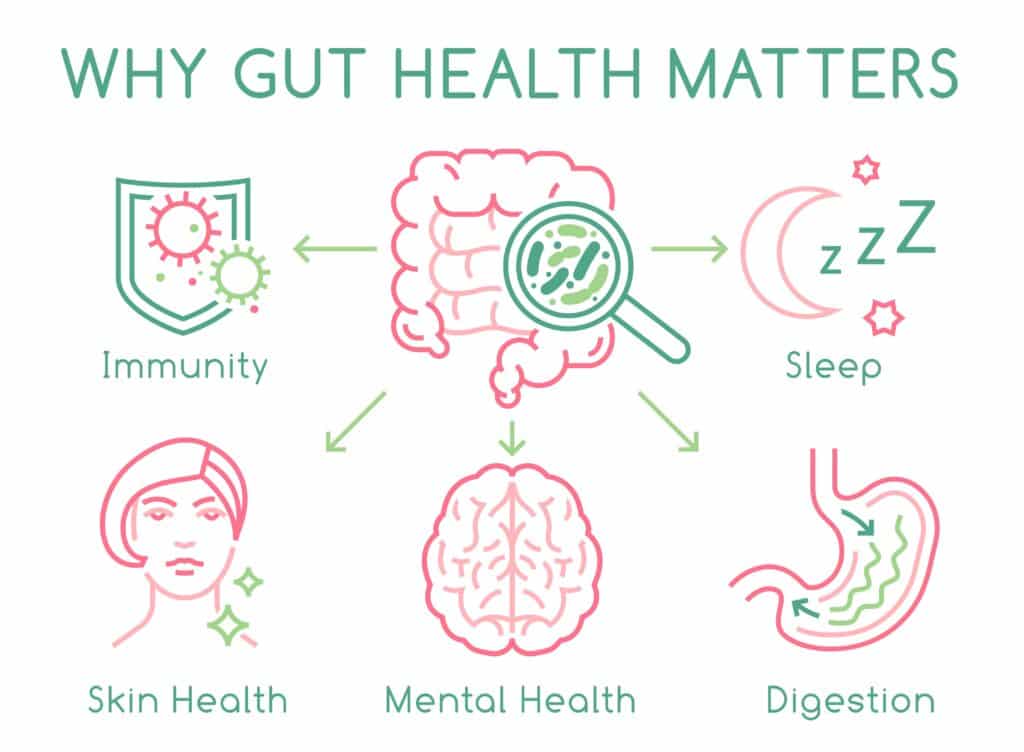By Kelcee Lyons
Healthier Gut, Happier You
Do you feel tired some days more than others? Extra bloated or stressed? Mental fatigue could be your culprit! Mental fatigue is a state of tiredness that sets in when your brain’s energy levels are depleted. It can affect your productivity, decision-making skills, memory, and mood.

Right after having my first baby in March of this year, we drove from a five-day hospital stay to our home with a fridge full of rotten food. My body was craving fresh nutrients that the hospital lacked in giving me. My husband, Sam, was back at work and it all came tumbling down on me, mentally. Baby this, baby that, there goes my stomach growl, but my motherly instincts started to kick in and all I could think and do is, “I have to do this for the baby!”.
When I was pregnant, people told me that nothing else would matter but the baby. I didn’t quite understand that until she actually arrived. My own self-care took a back seat. I was lacking in sleep, there was essentially no self-care, and my nutrition was definitely not where it once was. I was mentally exhausted! I started to get to a point where I didn’t care what my food tasted like or for the most part, what I was consuming.
For those of you that have gone through the breastfeeding journey, I’m sure you know where I’m coming from! Breastfeeding takes a ton of energy out of a woman – literally, calories galore. According to Women’s Health Magazine, a nursing mother can burn anywhere between 300-500 calories a day from milk production alone! Not to mention the postpartum hormonal drop and changes affecting the body.
It took me a few months to realize how much stress my body was truly holding onto. I threw all my frustrations on my husband and was an emotional rollercoaster. This may be common after pregnancy but not four months postpartum, surely? Finally, I got serious about what I ate since I needed to lose more baby weight.
The FIRST week of changing my diet and eating cleaner I felt a turnaround in my energy levels! I noticed that I had more patience with our daughter and my husband. Things that used to irritate me, I was calm about – it sometimes shocked me, and I would have a proud moment.
Before changing my diet, I was constantly bloated, at what seemed like all day and through the night. Then, through my nutrition, I was able to track what caused my inflammation. As I was eating healthier, I started to get comments about how clear my skin was. I never thought about it, but my skin was reflecting my gut health!
Mental health can have different signs. Sometimes we, ourselves, are not even sure we are having mental fatigue until someone says something to us about it. Then, we tend to get offended. So, what are some common signs of mental fatigue?
- Emptiness – You may feel as though you are the only person in the world, and no one can relate to what you are going through. This is when you tend to bury it deep, deep inside so no one notices. Trust me, people are noticing.
- Inability to focus – You are so tired that you can’t focus on the smallest task put forth. Squirrel!
- Sense of hopelessness – This is the step after emptiness. You have realized that something is wrong. You are not quite yourself. The main difference is you may feel there is no escape.
- Feelings of panic and anxiety – Now that you have realized it and feel hopeless, the anxiety starts to step in, and you wonder if you are going to feel like this the rest of your life. Is this the new norm?
The science behind your food and emotions

Think of the last thing you ate. Do you ever think about how the body and brain are connected after you consume the food you eat? Yeah, me neither, but just in case you were wondering, here’s how it works.
There is a connection between your brain and gastrointestinal tract (GI tract), often called your “second brain”. Your mood and emotional health are tied to the state of your gut. Your GI tract consists of billions of bacteria that influence your neurotransmitter production,
which are chemicals that constantly carry messages like clockwork!
Two examples of neurotransmitter chemicals are dopamine and serotonin. They are partly produced in your GI tract. When there are lower levels of these happy chemicals, it could make you feel depressed, sad, anxious, etc., but when they are higher, you feel more uplifted, joyful, and less stressed. Eating a well-balanced diet helps to promote the growth of “good” bacteria in your gut. This helps those ever so important mood-enhancing chemicals to become more balanced.
Let’s look at it on the opposite side of the spectrum. A diet based on easy to access, processed food, can create inflammation which restricts those happy chemicals, making you feel more down. With a balanced gut health, you will start to see fewer mood fluctuations which means less inflammation in your body. When your gut health is in good shape, your brain knows it and your emotions will reflect it!
Stress and your mental health
According to Cleveland Clinic, inflammatory cells are sent out when your body activates your immune system. Those cells attack bacteria or heal any tissue that is damaged. If your body is sending those cells when it is not essential, you could accumulate chronic inflammation.
The hormone that goes hand and hand with stress is CORTISOL!
Cortisol is a major stress hormone that affects human organs, including your brain. What’s the biggest offender to muscular and joint inflammation? That’s right, you guessed it. SUGAR! and for a number of reasons. One being, that it causes a spike in neurotransmitters like dopamine, however this is temporary. When you drink that prominent energy drink that has roughly 35 grams of sugar in it you feel energized. Like you can conquer the world! But two to three hours later, it eventually comes in like a wrecking ball and crashes your mood.
Next, sugar induces “bad” bacteria in your GI tract. Sugar, especially in excess, only creates temporary satisfaction and releases pro-inflammatory substances into your body. To decrease the amount of inflammation in your body, avoid caffeine and sugar. Having a well-balanced nutrition plan helps initiate anti-inflammatory signals which reduces any damaging inflammation in your body.
This is not to say that sugar is the end. Some sugar is okay. This is true when it comes to simple sugars after a workout. After we exercise, we drain our bodies reserves. This makes us feel tired and sluggish. The fastest way to refuel your glycogen levels is to have some sort of simple sugar. Your muscles are craving carbs after a workout. A simple sugar, such as dextrose, can help refuel your tank after a workout.
Look out for symptoms of chronic inflammation:
- Fatigue
- Abdominal pain
- Chest pain
- Joint pain or stiffness
- Fever
The big message here is that what you put in your body has a direct correlation to how you feel and your mood at any given moment. Do you need some additional help with your meal plans? Let Future Fitness Training help you get started on a customized nutrition plan.
Target these foods to boost your mood – and brain!
So, what are some foods that can help improve your mood? Here are just a few of the foods that can help you get started on balancing your mood.
1. Fatty fish
o Great in Omega 3s which may help reduce blood pressure along with other benefits.
2. Oats
o Top notch for a source of fiber. Fiber aids in slowing your digestion of carbohydrates. This helps sugar release gradually into your bloodstream which keeps your energy levels stable. Stable blood sugar levels mean you can control your mood swings and irritability. Oats also keep you fuller longer, so we are not searching the cupboards for something else to snack on.
3. Berries
o Sweetly packed with antioxidants and phenolic compounds which defend your body of oxidative stress – an imbalance of harmful compounds in your body.
4. Nuts and Seeds
o They provide tryptophan, an amino acid that produces serotonin – that happy chemical.
5. Beans and lentils
o These contain beneficial fats and fiber which help keep hunger from coming back sooner.
The World Health Organization stated that at least 80 percent of all heart disease; stroke, type 2 diabetes, and up to 40 percent of cancers, could be prevented if people ate better, along with
more physical activity, and no tobacco. Here are a few things you can do to improve your mind and body connection!
1. Create a plan to stick to.
This may be easier said than done. Don’t get discouraged if you fall off track. Just get back on it right away. Saying you will start on Monday, usually doesn’t work. Just start now!
2. Choose more whole grains and less refined sugars.
Ever notice that when you go to a grocery store all the snacks are in the middle of the store and the fruits, vegetables, and meats are on the outside? That is a whole other advertising/merchandising tactic that retailers have studied and frankly, have done quite well with. Simply put, stay away from the middle of the grocery store.
3. Drink plenty of water.
The age-old question, how much water should I drink? A good rule of thumb to go by is to drink half an ounce to one ounce of water per body weight every day. For example, if you weigh 150 pounds, you should drink 75-150 ounces of water a day. This may sound like a lot, but think of it like this.
In the morning you may go to Starbucks and get your venti coffee. That’s twenty-four ounces. Usually around 9-10 o’clock, your sugar rush is dying pretty quickly. Better get an energy drink. I’m going to be generous and say that you are getting the smaller one which is twelve ounces.
Lunch time! I’m going to give you the benefit of the doubt and say you are drinking a bottle of water. Here’s another twenty ounces. Usually around 3:00, people start hitting a wall. Their lunch is being digested and they start feeling tired. Here comes another energy drink. Twelve more ounces. You may drink some more water here and there. Let’s say another bottle gets thrown in. Twenty ounces.
Supper time. In Texas, I feel like most people for supper are all about their tea. So, let’s just say another twelve ounces. Now we all know that people just don’t stop drinking after supper. They probably have a glass of wine or something. Let’s just add up what we have listed above. That’s already a hundred ounces of fluid. Drinking your weight in ounces on a daily basis is completely doable!
4. Engage in consistent exercise.
The World Health Organization has recently changed their recommended exercise from days to minutes. They now recommend 150 minutes per week of exercise. Broken down, that is 30 minutes of moderate exercise five days a week.
5. Eat a variety of nutritious food including plenty of protein.
Eat the rainbow! This is a good reference to go by. Eating lots of nutritious greens, reds (berries), yellows (peppers), etc. is a good way to make sure you are getting all your recommended nutrition goals in.
Mental fatigue can be prevented and improved by making sure you eat healthy. Your mental fitness starts with you! Start by tweaking your nutrition little by little for better health mentally and physically. The best thing you can do for your family is to be sure you are healthy.
Not sure where or how to start or need coaching? Reach out to get help for a nutrition plan. Why shouldn’t you prioritize your health and happiness? Visit Future Fitness Training to improve your health journey. For more serious questions relating to your mental health, please refer to a professional for help. Nutrition and other lifestyle changes are minuscule if you are experiencing life-threatening symptoms at this time.



